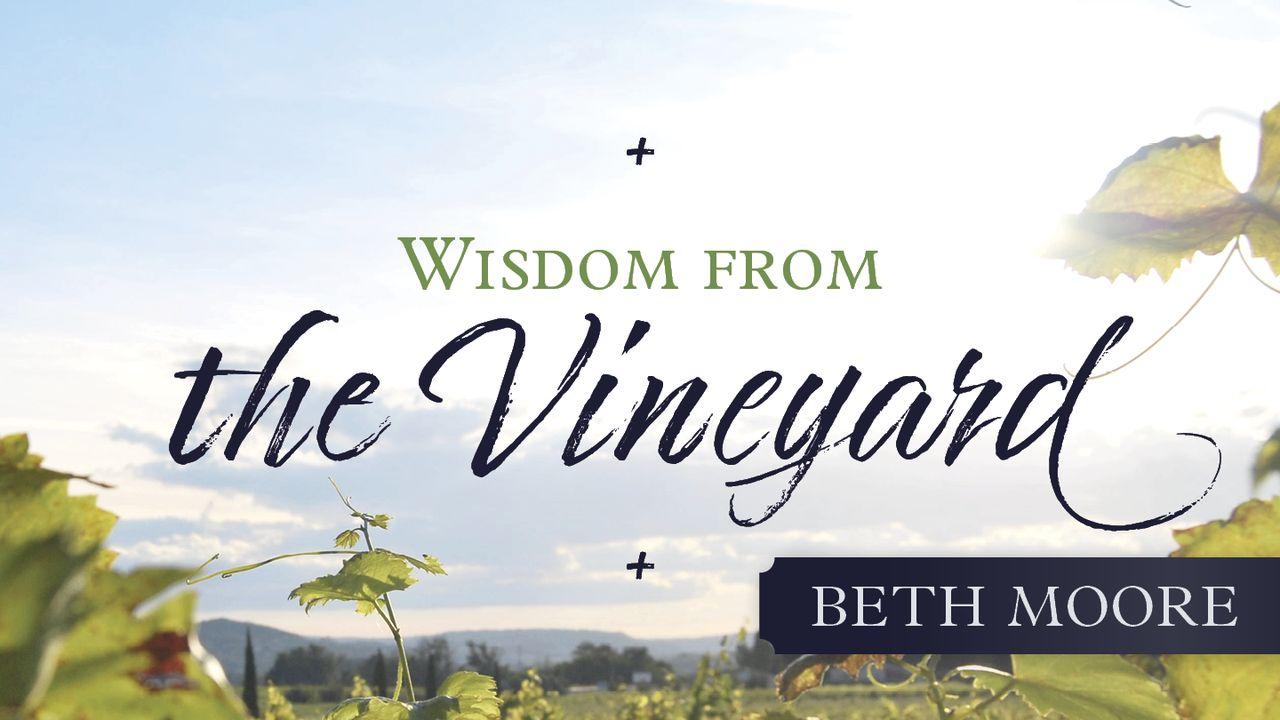Wisdom from the Vinyard by Beth MooreExemplo

I have been enamored with Christ’s teaching on the vine and the branches since I cut my teeth on Bible study, and I’ve taught about His call to fruitfulness as an essential part of life’s satisfaction for at least twenty years. The spectacular thing about Scripture, however, is that, like no other book held in human hands, its ink may be dry but it is the furthest thing from dead. The words are alive and active, and the Holy Spirit who inspired them can animate the most familiar passage and spring it to fresh life again in your soul.
It happened to me in Tuscany a year ago, on a dream trip I took with my daughters. The place was otherworldly. We stayed three nights at an inn on a hillside in the upper quadrant of a vineyard. I could stand on the grounds and in every direction I looked, I saw vines.
On our way into town by taxi one morning, we saw the last of the harvesters walking the rows—inspecting the vines and clipping the final heavy clusters of fruit. Captivated, I felt like I was watching live reenactments of some of Christ’s own parables. It was not lost on me that one of His final exhortations to His disciples was, essentially, “Be immensely fruitful” (John 15:5-8). The image of the vineyard has consumed me ever since.
When Jesus told His disciples, “My Father is the gardener” (John 15:1, NLT), He wasn’t using random imagery to sketch His point. From the very first book in the Bible, we discover that God is a gardener:
The Lord God planted a garden.
Genesis 2:8
From the beginning, it’s God Himself with hoe and spade. It’s God who’s afoot with herbs and bulbs. It’s God with the knack and no Farmers’ Almanac.
It’s a wonder to me that God would choose to slowly grow what He could have simply created grown. Why on earth would He go to the trouble to plant a garden forced to sprout rather than commanding it into existence, full bloom? Why leave His desk and get His pant legs soiled?
Because God likes watching things grow.
This metaphor plays out throughout Scripture as He tends His people with care, skill, and intention. When Jesus began His ministry on earth, He took this idea to a whole new level, revealing that He Himself is the Vine. He invites us to the sacred ground of abiding, calling us to flourish in the abundant life He offers.
The Bible uses gardening terms for the acts of God time and again. In 2 Samuel 7:10, God is described as appointing a people and not placing them, but rather planting them where He wanted them. Psalm 94:9 says God planted the ear on man, and according to Luke 22:51, Jesus could also clearly replant one, should that be necessary. Words like rooted and uprooted and grounded all speak the language of horticulture. God is the master gardener, and we, His tender seeds.
The Lord has chosen you and planted you, and He is preparing you for a great harvest. He’s getting you ready to thrive and flourish and bear much fruit. If we submit ourselves to His ways, mysterious and painful though they may be at times, we will find that it’s all part of the process that enables us to grow and bear fruit.
The Lord God planted a garden in Eden, in the east, and there he put the man whom he had formed. And out of the ground the Lord God made to spring up every tree that is pleasant to the sight and good for food.
Genesis 2:8-9
God delights in watching things grow.
Sobre este plano

Beth Moore takes you on a journey to show you how everything changes when we understand and fully embrace God’s amazing design for growing us and giving us fruitful, meaningful, abundant life.
More

